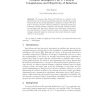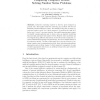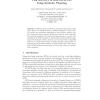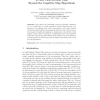85
Voted
AGI
2015
9 years 10 months ago
2015
This paper motivates the study of counterpossibles (logically impossible counterfactuals) as necessary for developing a decision theory suitable for generally intelligent agents e...
90
Voted
AGI
2015
9 years 10 months ago
2015
This paper argues the possibility of designing AI that can learn logics from data. We provide an abstract framework for learning logics. In this framework, an agent A provides trai...
73
Voted
AGI
2015
9 years 10 months ago
2015
We propose that Solomonoff induction is complete in the physical sense via several strong physical arguments. We also argue that Solomonoff induction is fully applicable to quant...
AGI
2015
9 years 10 months ago
2015
Inductive reasoning requires to find for given instances a general rule. This makes inductive reasoning an excellent test-bed for artificial general intelligence (AGI). An exampl...
AGI
2015
9 years 10 months ago
2015
Abstract. Methods of simulated annealing and genetic programming over probabilistic program traces are developed firstly. These methods combine expressiveness of Turing-complete pr...
74
Voted
AGI
2015
9 years 10 months ago
2015
This paper discusses several key issues in temporal and causal inference in the context of AGI. The main conclusions are: (1) the representation of temporal information should take...
81
Voted
AGI
2015
9 years 10 months ago
2015
Abstract. Since universal induction is a central topic in artificial general intelligence (AGI), it is argued that compressing all sequences up to a complexity threshold should be...
84
Voted
AGI
2015
9 years 10 months ago
2015
Dependable cyber-physical systems strive to deliver anticipative, multi-objective performance anytime, facing deluges of inputs with varying and limited resources. This is even mor...
AGI
2015
9 years 10 months ago
2015
Building formal models of the world and using them to plan future action is a central problem in artificial intelligence. In this work, we combine two well-known approaches to thi...
78
Voted
AGI
2015
9 years 10 months ago
2015
Grid cells in the entorhinal cortex are generally considered to be a central part of a path integration system supporting the construction of a cognitive map of the environment in ...





